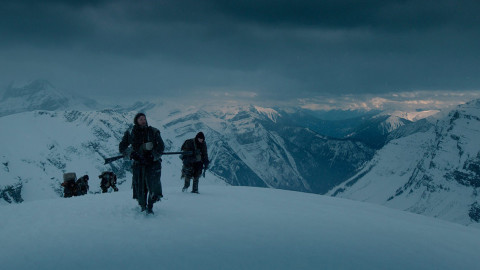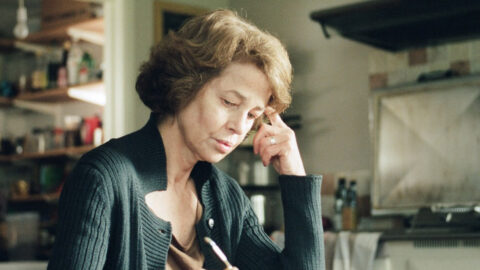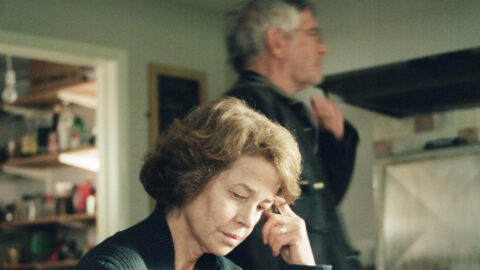Let Us Go Then: On 45 Years
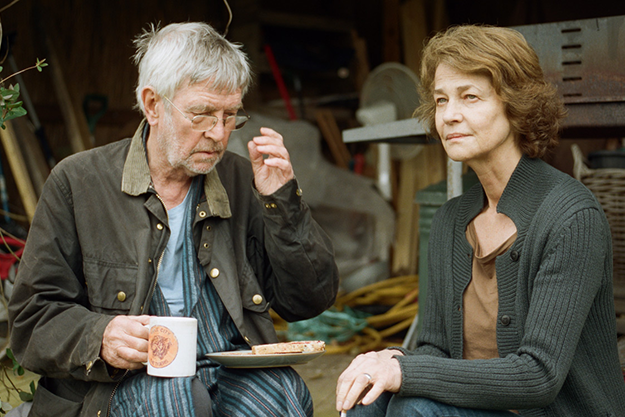
About a year ago at the Berlin Film Festival, Tom Courtenay and Charlotte Rampling won acting prizes together for 45 Years. It would have seemed indecent to honor one and not the other. It’s natural, and accurate, to say they are both “wonderful” or “touching” or “expert” in the film, and participating in a kind of union. They are the Mercers, Kate and Geoff. But that’s not enough as commentary, or as a solution to the discord in those three adjectives. Together night and day, these are two lonely people drifting apart.
Writer-director Andrew Haigh has made a film about Kate at the fundamental, formative level. She is active and she is now. She is alert and even officious, while Geoff can lapse into the flatness that may hint at senility or withdrawal. She walks the dog, she cooks the meals and drives the car; she is doing the preparations for the party to mark their 45th anniversary. When they try to make love, Kate is the one who is accommodating, and forgiving. She has solo passages denied Geoff where the camera wonders what she is thinking. Passing music and sound effects lap against her point of view, and as the film is an examination or a test of this couple, so she is the detective who foresees failure. She brings herself to the edge of going.
In the crucial “Wednesday” passage, when they are side by side in bed waiting for sleep, she asks whether he would have married his old lost love, Katya, if she had lived, and when he admits, yes, he would, she turns away into a bleak close-up and says she can’t talk about it anymore. The film never quite addresses the point, but we cannot ignore it: Charlotte Rampling is younger than Tom Courtenay. She is close to 70, but he is bumping into 80. It’s a film of two-shots as a deliberate policy, yet it can’t resist the gravitational pull of separated close-ups.
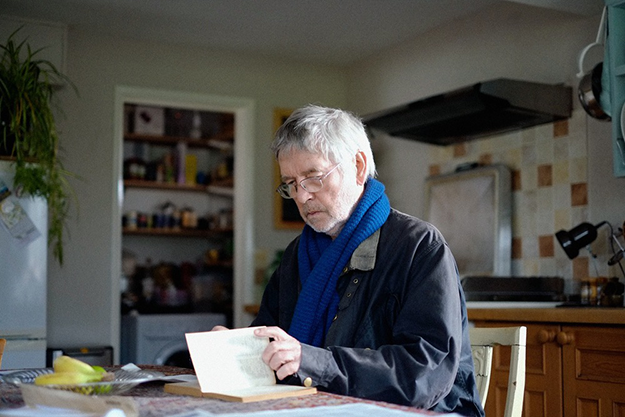
But it’s Geoff who has woken up out of slumber or stillness. A precious part of his past—“I’m sure I told you about her,” he says to Kate with a vagueness that bespeaks unspoken attachment—has been perfectly preserved. Is Kate jealous because her life had no such moment?
What qualifies a critic to take on a film? Well, when it comes to 45 Years, I have been married that long, though I should say that two wives shouldered the burden. Still, it seems to me that some younger critics’ reverence for the film misses a depth of experience alleged in its title, but missing. So, yes, the film is meticulous and composed: it amounts to a stealthy trap being set for us. Though furnished in terms of a country cottage, rural peace, an amiable dog, and two deft British performances, this is a tough, hopeless film.
The Mercers have been married 45 years. They seem free from poverty and the most cruel inroads of aging. He had a heart bypass five years ago, nothing worse, unless one picks up on the blankness that may be growing in him. Even so, the film’s action is prompted by an attempt at emotional reawakening on Geoff’s part. Apart from that, the 45 years have left them both oddly unmarked, or like sleepwalkers in their routine. Did Kate have no other love?
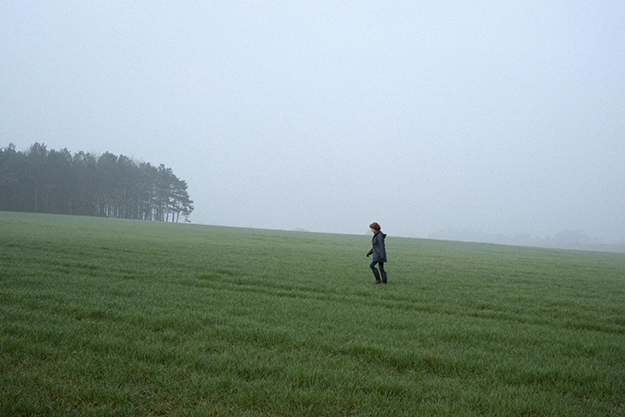
They have no children, which would surely count as their decision in real life. But for characters in a story, the question “Why no children?” has to be significant. It is only added to by how little we know about what they did in their lives. Were there jobs, with fulfilment or frustration? I think she taught; I believe he was a trade union official. But those outlines have no substance or flavor—no experience. Did they travel or have they always been in this unspectacular but secure village? Did they have passions, follies, vocations? What did they do for 45 years? Even in England, in the flat Norfolk where it was shot, people do things. They do not wait patiently for some shocker from the past.
As the movie opens, Geoff receives a letter from Switzerland. Why some officialdom has seen fit to inform him—or how it knew of his whereabouts—is unclear. But the 50-year-old news makes a shocking cutaway. Some alteration in glacial formation (this is a bit of a global warming story, though the impact is chilling) has revealed the corpse of Katya. Perfectly preserved. She is as she was when she was killed in a fall in the snow and the ice. She and Geoff were lovers then, and we will learn later that Katya was pregnant with their child.
Geoff is startled and upset, but less tragically afflicted than given a glimpse of vitality. The reappearance of the pristine Katya is an accident of fate. It tells him nothing he didn’t know; it cannot fill him with guilt or dismay towards Kate—she came into his life several years after the death of Katya. There is no infidelity at work, yet it becomes the intent of the film to reveal to Kate that she never quite knew Geoff or offered him the life that Katya had, or which Geoff now feels in retrospect. In the famous last shot of Kate, Charlotte Rampling’s face is distressed by a kind of emptiness.
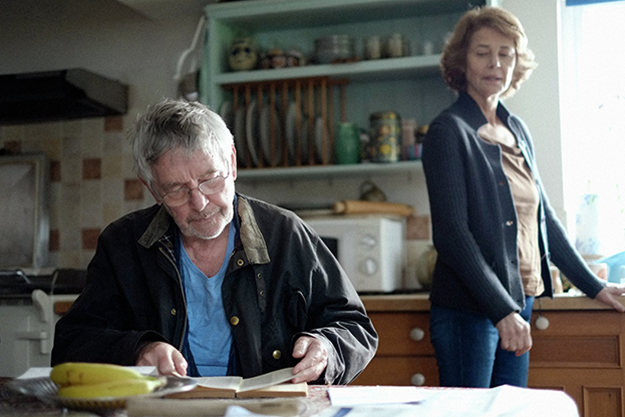
Most lovers, most married people, hold incidents from their past that may be too precious to share. That does not mean those pasts threaten the marriage that has followed. It is more that we guard—and sometimes forget—our pasts. That is our privilege, and I think most married couples recognize that and let the past be, unquestioned and unrevived. Because you are with another person does not mean that a prior association is disowned. So long as there is memory and an alert intelligence, we cannot quite leave or give up anyone, and we might as well not try.
There are possibilities inherent in the Mercer situation that the film does not pursue. Geoff might keep silent about the letter just because he does not want to trouble Kate. Or she might go out of her way to understand Geoff’s upset, and to make it clear to him that she is not ruffled by this odd retrieval. The two of them might talk about the whole thing. Geoff had not told Kate before that Katya was pregnant. She learns that only from going through the slide photographs from 50 years ago—the past that is accessible and waiting in the attic. It’s even possible that the reawakened past might bring Geoff and Kate closer.
But the movie risks being a studious setup: Kate and Katya are giveaway-close as names; and Katya’s pregnant tummy counters the childlessness of the Mercer marriage. There is something else, not just grave but almost dank. It is as if Kate has been waiting all along, for 45 years, for something that would confirm the hollowness of her marriage. That is less than kind in her and in the film, and I have to say that it is underlined by the closure that lives in Charlotte Rampling’s face.
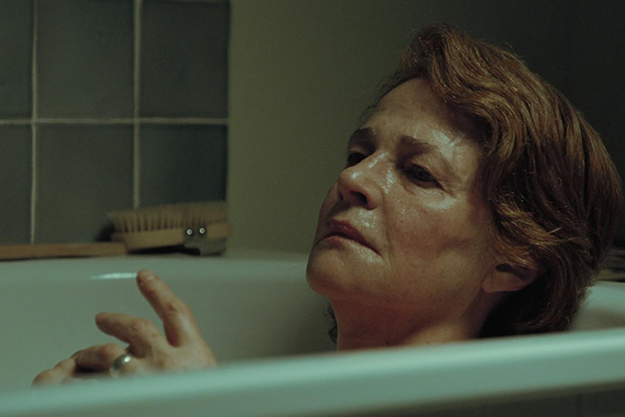
We are supposed not to think such things about actors, but how can that be when 45 Years puts such stress and emotional trust in Rampling’s face? She has an unquestioned movie presence, but it is not quite warm or generous. She has always expected the worst, and you can feel that in The Night Porter, The Verdict, Stardust Memories, Paris by Night or even Dexter. Recast Kate—with Judi Dench, Vanessa Redgrave, or Lindsay Duncan—and I think some pathos or sympathy seeps into the picture so that that final close-up becomes less bleak. Equally, without Rampling some foreboding would be lost. Movies deserve and expect to be judged by their casting.
I do not mean to say that married people may not suddenly trip upon futility after 45 years. But I think such a marriage deserves to be more fully inhabited, if only because the accumulation of experience should challenge Kate’s ruined and judgmental gaze. Because this marriage is so empty we are led to see that the film has no faith in the institution it is resolved to dismantle.
* * *
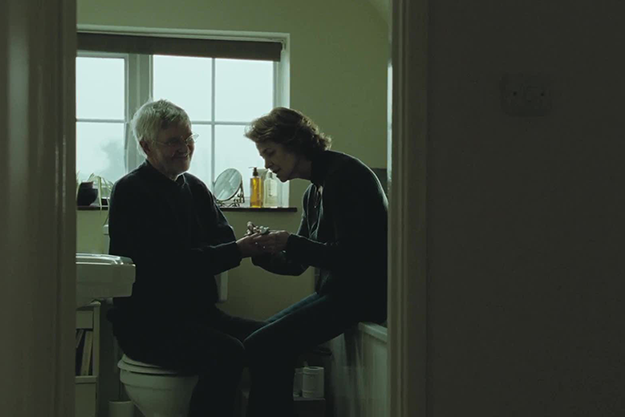
It’s natural to say that 45 Years is the kind of novelistic film we can enjoy nowadays, with the pressure of mainstream box-office removed. But that’s a perilous new game that exposes good films to the suspicion that they never can reach the inwardness in written fiction. So I think it hurts 45 Years a lot that it is seen and felt from Kate’s corner and that the years of their marriage are so flat or null.
The situation is so promising: that a man is reminded deeply of an old love, while his wife learns from it that their marriage was always unsound, or not quite inhabited. But then the picture has to describe that marriage and those years. At which point, surely this detective Kate would have quit. Why were there no children, or nothing else to fill their emotional energies? Why is there so little trace of fun, change, unruliness, or fighting from those years? Why do they have no photographs of themselves (to match the pregnant glimpses of Katya)? Are we meant to conclude their life was barren or unphotographable? Surely that is foolish: in life, people who were not ideally suited romantically—who were not movie-like in that way—have made the decision, and acquired the habit of getting along. They worked at it. Truth to tell—and it is told in novels sometimes—in life people are not movie-like.
So this could be a larger film, truer and less tidy, if Kate’s mounting disquiet was balanced by Geoff’s rediscovery of what his romantic potential was once in life. At that level, we might see them both jolted, set back but then rallying. Katya could even be the ice maiden who warms them up again, or brings them a kind of education. Courtenay’s Geoff, even near the end of his cognitive tether, might learn from this. But Kate’s gaze will not be shaken from belated proof that their 45 years was a sham and even a desert. That is so resolutely external a vision that it exposes the limits of even good filmmaking. These two deserve better. They deserve the revealed inwardness of, say, Michael Haneke’s Amour, a film that believed in marriage even to a point of departure.



